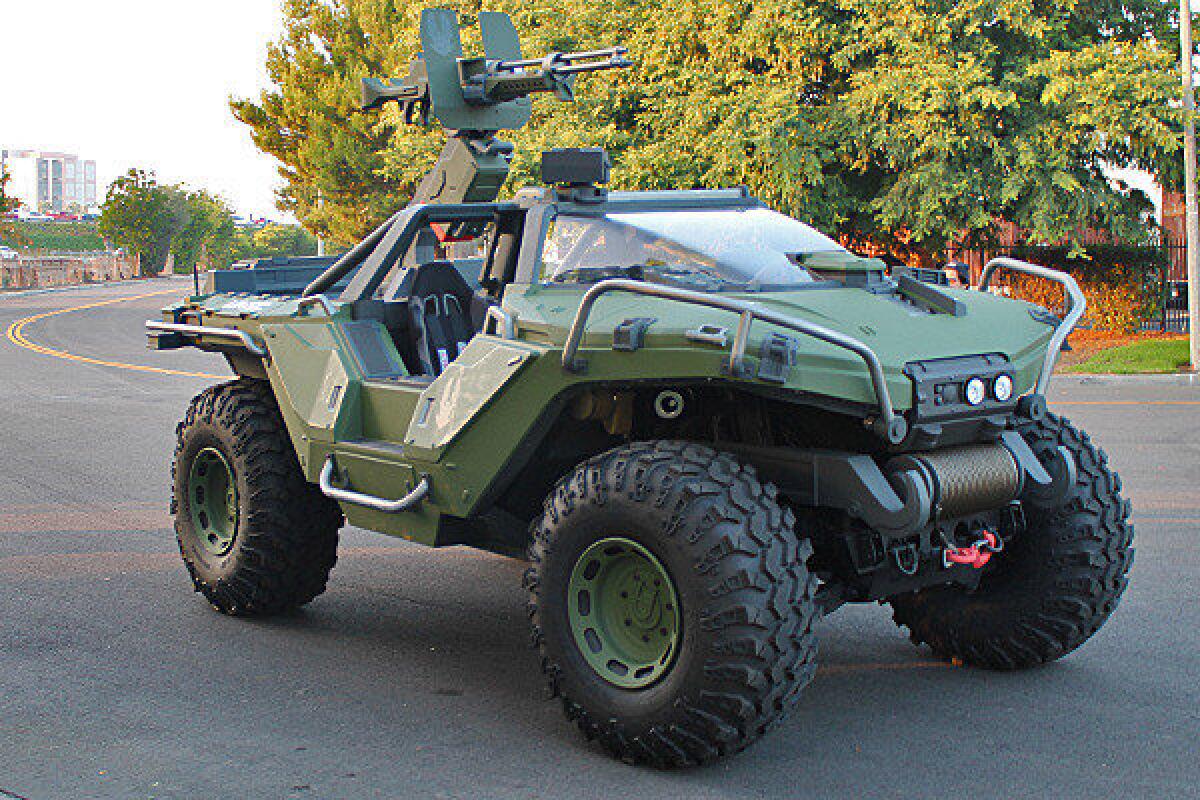Halo’s Warthog goes from pixels to reality

- Share via
On a quiet street in a commercial section of Irvine, Aria Group builds an over-the-top array of vehicles: concept cars destined for auto shows, custom Porsche replicas, functional movie props.
And now, maybe their wildest offering yet: the Warthog.
The name will sound familiar to anyone who’s played “Halo” on Microsoft’s Xbox gaming console. The Warthog is a massive open-topped, all-terrain vehicle -- a mashup of dune buggy and monster truck -- that players navigate through a futuristic, first-person shooter landscape.
Photos: a real-life “Halo” Warthog
Built on the chassis of a Hummer H1, this real-life Warthog is almost 8 feet high, more than 8 feet wide and more than 17 feet long. The body matches exactly the proportions of the Warthog in the game and rides on immense 49-inch tires. A brief test drive put the driver of a UPS truck at eye level.
The vehicle was commissioned by 343 Industries, a subsidiary of Microsoft responsible for making “Halo 4.” This latest chapter in the Halo series came out on Nov. 6 and quickly racked up $220 million in sales in its first 24 hours of release. To date, the “Halo” franchise has pulled in $3.5 billion in sales and sold 50 million copies since the first “Halo” was released in 2001.
“We really just wanted to build something that people could literally see and touch and reach out and enjoy,” said Frank O’Connor, franchise development director at 343, who has worked on the “Halo” series for a decade.
O’Connor says his team had to persuade the marketing department to approve the idea and the budget. Pat Devereux, the chief executive of Antenna, the L.A.-based marketing company that 343 Industries hired to make the Warthog a reality, says that budget ran “hundreds of thousands of dollars.”
Devereux says 343 sent him “gigabytes and gigabytes” of data on the Warthog from the Halo games, which he then took to Aria Group to see what was possible. “With these guys, the answer is always yes, “ he said of Aria.
Aria is the force behind numerous concept vehicles shown at events like the Detroit Auto Show and Los Angeles Auto Show. Automakers including Kia, Hyundai, General Motors and Honda have all had Aria build concept vehicles for this purpose. Such concepts are often used by automakers to gauge public reaction to a design before bringing it to market. So the precision and build quality of these concepts needs to be perfect.
Aria also makes carbon-fiber bodies for replica vintage Porsche for Singer Vehicle Design. The company has also made cars for films: It designed and built the NASCAR vehicles in “Transformers 3.”
Mark Ferrara, chief project manager at Aria, says this kind of experience made the Warthog project relatively easy.
“We build so many prototype vehicles,” Ferrara said. “This was not a particularly challenging vehicle for us.”
Ferrara’s team spent six months creating a Warthog body identical to the video version, down to the smallest detail: fake rivets on the industrial-grade foam or plastic reinforced fiberglass body panels, hand-holds to get into the vehicle, and the gauges in the Warthog’s interior with static readouts. Even the horn has been lifted from the game and attached to a speaker.
The vehicle is essentially a pickup, with two conventional seats in the cabin and a truck bed. There are no doors, just a low sill. Mounted in the bed is a fake 50-caliber machine gun.
Underneath the hand-assembled skin is the chassis, transmission and engine from a 1996 Hummer H1. It has a 6.5-liter diesel V-8 engine and a four-speed automatic transmission. For safety purposes, the Warthog has a top speed of only 25 mph. But it can do more.
“We happen to know on good authority it will exceed the in-game speed limit too,” O’Connor says. That in-game limit is 68 mph.
There are only two notable differences between the real and digital Warthogs. First, the in-game version has four-wheel steering, which would have cost far too much to build from scratch. Second, the real version is 12% smaller than it would have been had Aria made it on a 1:1 scale. Shrinking it was necessary because the Warthog needed to fit onto a trailer narrow enough for use on public roads.
Still, the Warthog dwarfs anything -- and anyone -- around it. Sitting in the drivers seat gives a view of only the fixed gauges and the bottom of the steering wheel. The actor hired for public appearances as “Halo” protagonist Master Chief is 6 feet 10. In costume, he stands at a full 7 feet 2 -- and fits perfectly in the driver’s seat. For those less vertically inclined, driving the Warthog requires sitting on the seat’s front edge while peering over the steering wheel.
Despite its mass, the Warthog actually moves about with ease. Underneath the faux (but proportionally accurate) shift lever is the actual transmission shifter. Pop it into gear and you’re on your way, with more road presence than a Panzer tank.
The steering has a surprising amount of feedback and the diesel motor can handle the Warthog’s 7,200-pound weight. Turning is tricky with the poor visibility, but it’s unlikely you’d feel anything if you hit it.
The few minutes that the Warthog was parked on the street saw half a dozen young men materialize out of neighboring buildings, picture-taking phones in hand, questions ready. O’Connor said this is the reaction that fueled the creation of this working model.
“The first time people set eyes on it in real life, that’s when you see where the value is,” he said. “When somebody is standing next to the tire, and it’s coming up to their shoulders, they’re getting a sense for this thing they’ve grown up with.”
The Warthog will make appearances at events including the annual Electronic Entertainment Expo (E3) and ComicCon, as well as at internal events at Microsoft’s headquarters in Washington.
Buyers with deep pockets may even be able to take home a version of their own, Devereux said. With the hard work of developing the concept done, Aria is equipped to build fully capable iterations. The company has already had some interest from prospective customers in the U.S. and abroad.
”We’re talking to Microsoft about possibly licensing it,” Devereux said. “What says ‘I love you’ like a real Warthog? If you have a lot of money and your son plays ‘Halo,’ Christmas could be nuts.”
ALSO:
Photos: a real-life “Halo” Warthog
Riding shotgun in a prototype Porsche supercar
Photos: Highlights from the 2012 L.A. Auto Show







